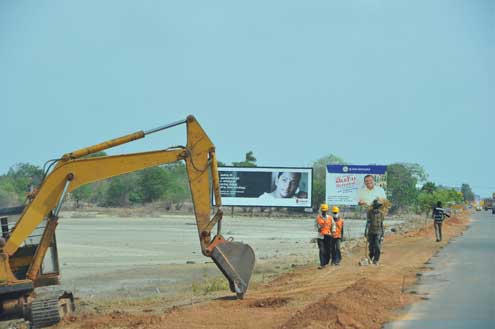By Johann Rebert, Asia Foundation, San Francisco, March 16, 2016
Following parliamentary elections in August 2015 and six years after the end of a bloody, decades-long civil war, Sri Lanka’s newly elected president, Maithripala Sirisena, has made the important decision to keep the Ministry of Environment directly under his wing. The move, which also positions the president as the new Minister of the Environment, signals a shift in priority and visibility for environmental protection in Sri Lanka, as well as a stronger commitment to the new Sustainable Development Goals.

As investors rush in with new development and construction projects, Sri Lanka is experiencing an unprecedented post-war infrastructure boom with new hotels and paved roads and highways being built across the country, including in the war-affected North and East. Photo/Karl Grobl
Concerns about deforestation have been growing in Sri Lanka. While water quality, food security, and coastal conservation have long been critical issues, deforestation has been largely overlooked until the war ended. Now, as investors rush in with new development and construction projects, Sri Lanka is experiencing an unprecedented post-war infrastructure boom with new hotels and paved roads and highways being built across the country, including in the war-affected North and East. Much of this development is taking place on “state-owned” land, a significant portion of which includes primary forest areas.
Sri Lanka’s Forest Department has announced that it aims to increase forest cover from 24 percent to 35 percent by 2020. To achieve such an ambitious goal, effective protection of existing forested land is vital. Sri Lanka’s forested areas and reserves are primarily managed by the Forest Department and the Wildlife Department. However, there are a number of forest reserves and national parks that are not governed by either department. These “State Forest Reserves” fall under the authority of Divisional Secretariats – local civil administration bodies that have the legal authority to protect these areas – but the Secretariats are often unclear about the environmental regulations that exist. As such, they are not well positioned to implement these regulations.
Since 2006, the Ministry of Environment has made an effort to clarify the regulations, issuing informational circulars to public officers around the country. However, confusion about these circulars remains high, particularly in the war-affected Northern Province where awareness is the weakest. For example, the local Divisional Secretariat in Mannar District was recently entrenched in a controversy over whether certain new housing settlements for families displaced during the war were encroaching on the Wilpattu nature reserve. While some conservationists insisted that they were indeed violating the reserve’s boundary, local authorities contended that the settlements were legal. As circulars clarifying this situation were only made available in the Sinhalese language (the northern province is 97% Tamil speaking), and general awareness on environment regulations was already so low, they had little impact on helping to clarify the politically sensitive situation.
Starting in August 2015, The Asia Foundation partnered with the prominent local environmental organization, Environmental Foundation Limited (EFL), to raise awareness and understanding of environmental issues and regulations among local authorities. To start, we translated the circulars into Tamil and English. We then conducted a series of eight workshops in all five districts of the Northern Province between August and September, bringing together over 150 senior government officials, including Divisional and District Secretaries, senior police officers, environmental officers, and land use planning and social service officers. During the workshops, EFL explained the content of the forest circulars and existing forest ordinances and how they relate to the legal use of state land. Representatives of the Forest Department clarified the responsibilities of relevant local authorities and provided information on key environmental problems in the Northern Province.
The majority of the concerns brought up at the workshops revolved around timber felling and transportation without proper permits. Police officers raised questions on the permit procedure for limited timber species, such as hardwoods like teak, and ways to identify them. We discovered that Magistrates in the North are largely unaware of the basic environmental laws necessary for the prosecution of offenses related to illegal logging and transportation, and that the police do not have copies of the Forest Ordinance that would enable them to better articulate legal provisions in cases that appear in the courts. It was evident from these discussions that in addition to limited understanding of regulations, authorities in the region also lack the coordination and communication needed for enforcing existing environmental laws.
The workshops also highlighted the need for a clearer delineation of forest land boundaries between State Forest Land managed by the Forest Department and other developed land that is managed by the Divisional Secretariats. This lack of clarity leads to multiple claims and disputes, which can often exacerbate existing community tensions over natural resources.
As a result of the workshops, the Forest Department acknowledged the significant shortcomings in communications on forest laws, as well as the critical need for further education and support in implementation. By establishing a forum where government officials can come together with the local community to increase collaboration, the workshops are helping to curb misuse of forest land and ensure land use according to the law.
Johann Rebert is The Asia Foundation’s deputy country representative in Sri Lanka. He can be reached at. The views and opinions expressed here are those of the individual author and not those of The Asia Foundation or its funders.
http://asiafoundation.org/2016/03/16/deforestation-now-urgent-concern-in-post-war-sri-lanka/